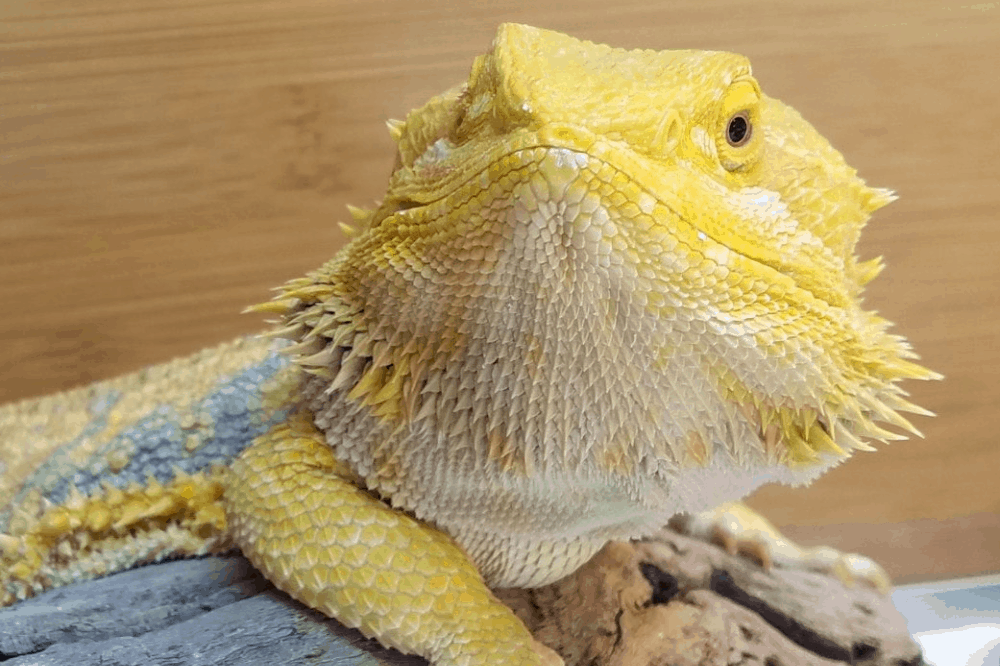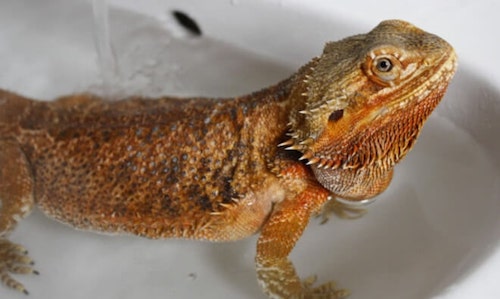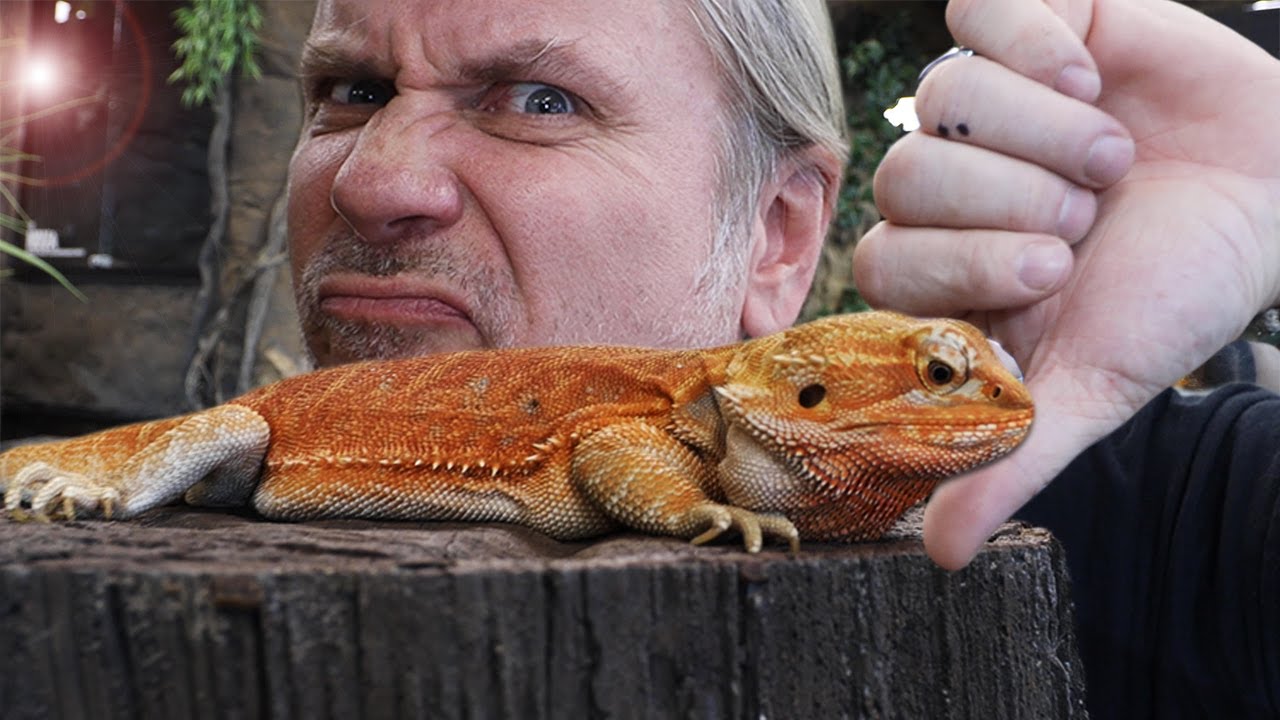Bearded Dragon Odor
If a bearded dragon is something you’re thinking about obtaining as a pet, you probably have a lot of concerns. A common and simple-to-care-for reptile that many people adore is the bearded dragon.
Nonetheless, a lot of individuals want to know if they smell awful for non-owners. We need to investigate the question of whether bearded dragons smell.
Bearded dragons don’t smell, unlike what many people think. Unlike many other animals, adult or baby bearded dragons don’t have sweat glands, thus they don’t actually exude a lot of their own stench.
Conversely, the scent that comes from a bearded dragon is caused by a dirty environment, and it may be readily fixed with the right care.
Reason Why Your Bearded Dragon Smells Bad

1. Bearded Dragon Poop and Urine
Depending on nutrition, some adult bearded dragon excrement has a bad odor that may be detected from across a room. The most crucial strategy is to get it out of the cage as soon as you can to prevent it from getting worse.
There are charcoal odor bags that may be put next to the enclosure to help with the awful smell if you won’t be there. When you get back, you should clean up the waste.
Using newspaper or paper towels as your substrate will make dealing with the excrement removal process the simplest possible. You gain from it in two ways. It is simple to observe where your beardie has defecated, and it is also simple to alter.
To avoid the smell of beardie poop, it’s crucial to maintain your bearded dragon’s tank clean. The majority of bearded dragon homeowners who claim that their pets “smell” typically doesn’t have clean enclosures.
It may be a good idea to have your dragon’s poop examined for parasites by your veterinarian if you detect a particularly unpleasant smell coming from it.
This is among the explanations for why we advise performing spot cleaning for excrement at least 1-2 times per day. Salmonella germs won’t spread as a result of this. The folks who claim that this lizard has a foul odor let it stay in the tank for a few days before washing it.
2. Poor Choice of Food
The bearded dragon’s cage is housed in is the main reason why they frequently stink. You will smell a terrible odor if they are given crickets, particularly if they die within the cage.
Crickets swiftly rot once they die, which causes this bad smell. Because of this, bearded dragons should not be fed crickets. Other worm species, including the super worm, also fit this description.
3. Remaining Food
Uneaten food is a significant issue that can result in a smelly bearded dragon habitat. Food left alone will begin to deteriorate and may release a foul smell. It’s recommended to remove any uneaten food after 15 minutes of feeding time because crickets often bite beardies.
Moreover, leftover food may draw flies and other insects that may transmit parasites. After 24 hours, make sure to throw away any food that wasn’t yet consumed. This might also make your dragon sick if they consume the leftovers.
4. Bearded Dragon Enclosure
An enclosure is where you can keep your dragon alive. However, a smelly enclosure is caused by leftover food, contaminated water, filthy reptile carpet, or dirty substrate, which can cause bearded dragons from smelling. In turn, this one will make your tiny pet begin to smell.
A dirty tank can encourage the growth of bacteria that could hurt the fish in the future, in addition to being difficult to look at and smell.
A deeper cleaning with a safe disinfectant is also advised once a month, followed by a more thorough cleaning once a week. Moreover, you need to wash their trash cans at a minimum every month which can reduce the smell.
5. Dirty Substrate
Many people are unaware of this, but your bearded dragon may have an unpleasant odor because of the substrate in the bearded dragon’s enclosure.
A substrate with a bad odor will eventually be old or improperly cleaned. This could smell bad and possibly make your beardie sick if bacteria and fungi grow in the substrate.
Nevertheless, odors can come from more than just soiled or outdated substrate. A very strange and disagreeable scent is frequently present in a new substrate made of chemically treated woodchips.
This inferior substrate might release harmful compounds that can injure your dragon in addition to an odor that your dragon’s skin could be able to absorb.
6. The Beardie Is Sick
If your bearded dragon is emitting a smell especially, your pet may be ill. This is particularly true if they appear listless, lose interest in feeding, have excessive mucous, or have overt open-mouth breathing.
How to Get Rid of the Smell?

Most of the time, the key to a bearded dragon with a good odor is in your hands. You can perform a variety of actions to maintain the cleanliness and health of the area in which your dragon lives. Let’s go over some quick fixes you can implement to stop your bearded dragon from smelling.
1. Deep Clean the Bearded Dragon Enclosure
Keep the tank clean if it smells and on top of maintenance. This can help maintain your healthy bearded dragon and lessen the scent. Either once or twice a day, you must locate the tank, eliminating food scraps as well as the fish’s waste and urine.
At least once a week, you should thoroughly clean the tank, including the substrate and all of its surfaces. Be sure to use a disinfectant free of dangerous chemicals.
Lastly, you must perform a deep cleaning of the enclosure once a month, which entails taking everything out and washing the whole tank with soap and water or a secure sanitizer.
2. Bathe the Beardie
Give your bearded dragon a nice, warm wash and a good soak to help get rid of the smell. A beardie may occasionally have a fungal infection, which might have a fishy smell.
It will have an excellent chance to hydrate as a result of this. You could give it a nice washing by using a really soft brush to carefully scrub its tummy, legs, and tail. Warm up the water in the bath and let the beardie soak without adding any soap.
It’s a good idea to provide your bearded friend with a water supply before bathing him to lessen the likelihood that he will consume contaminated water and also they will smell better.
3. High-quality Substrate
The substrate in the tank, which many people are unaware of, can be the cause of your beardie’s unpleasant odor. Unattended food and excrement can get caught in between loose substrates, where they are simple to overlook during routine cleaning.
Certain substrates, like wood chips, can also absorb moisture and encourage the growth of germs. They might also take in some smells. Substrates that resemble sheets, such as reptile carpets or tiles, are a little bit simpler to maintain and keep clean.
Newspaper or paper towels, as well as reptile carpets or tiles, are simpler to take care of surfaces with lower odor-producing potential. Yet, they still require routine cleaning or replacement.
4. Check for Fungal Infection
A dusty, unclean cage with relatively high humidity levels might hasten the spread of bacteria and fungi.
Sadly, the skin and nutrition of your bearded dragon might be impacted by these growing.
You should prepare to visit the vet if you notice anything strange about your dragon’s look, behavior, or disposition. Lethargy, frequent hiding and gaping, appetite loss, and mucous or inflammation in the eyes, nose, or mouth are all symptoms of fungus infections.
By maintaining cleanliness in your dragon’s enclosure, providing a nutritious diet, adequate hydration, and the right amount of heat, humidity, and lighting, you may prevent these diseases.
5. Use Cleaning Products
There are numerous treatments available on the market that can lessen the smells coming from a lizard’s habitat. You can assist minimize odors by combining odor-reducing substrate with the kind you already use. Moreover, specialized liners feature enzymes that can assist lessen odors and can make cleaning much simpler.
Conclusion
Although bearded dragons don’t smell, their surroundings undoubtedly do. You should consult your veterinarian if you bathe your bearded dragon, but the smell persists because it might be a sign of a medical problem.
But, any potential odor will be minimized as long as you keep the cage clean by spot cleaning and periodic and weekly full cleans. Your beardie will unquestionably be happier as a result.
FAQ’s
What causes a bearded dragon tank to smell?
Bearded dragons usually do not smell. The smell may be primarily caused by organic waste and germs in the cage; good pet care and cleanliness will lessen the smell and support the health of your cat.
Do bearded dragons’ poop smells stink?
Bearded dragon poops and pee can lead to a smelly situation. However, the bearded dragon’s poop smells. To maintain your tank smelling fresh, be sure to empty it at least twice a day of any remaining food, waste, or pee.
How do I get rid of the smell of the bearded dragon?
Keeping your bearded dragon enclosure as clean as you can is one of the most crucial actions you can do to prevent your bearded dragon to smell.
Does the bearded dragon have parasites?
In severe circumstances, parasites may result in nausea, vomiting, weight loss, and/or foul-smelling feces. The gastrointestinal tracts of bearded dragons harbor a variety of motile protozoa, including pinworms, frequently.
Hugues Beaufrere is the Exoticpetia’s senior writer and reptile expert. He has been fascinated by reptiles and monkeys since he was a kid and had years of experience in herpetology and primatology. He has cared for various kinds of Monkeys, Lizards and Reptiles and loves to share his knowledge and passion with others.


